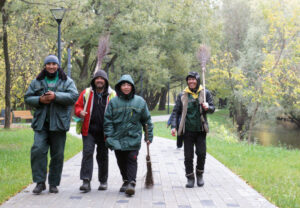Right at the start of our conversation, Sergei is keen to emphasise that he never killed anyone. “I wouldn’t be able to live if I was responsible for hurting anyone,” insists the former Russian soldier, who spent several weeks on the frontline with Ukraine in the war’s second year.
Claiming he never used his rifle — even for protection — the conscript says his refusal to fire his weapon in anger is how he ended up wounded within days of arriving on the battlefield. “I was lucky to get injured within the first few days,” Sergei remembers. He first spent a week at a field hospital in occupied Ukraine, before being sent back to Russia as his wound became infected.
But even as Sergei (not his real name) was recuperating, he was informed that he would soon be sent back to the killing fields. “I couldn’t go back,” he recalls thinking. “I couldn’t be part of this.” And so, with the help of an underground Russian railroad, he hatched an escape plan, one that would take him on an epic journey through the Russian wilderness to freedom.
Yet if Sergei is now safe, hiding out in exile abroad, Idite Lesom, the organisation which saved him, is setting its sights far higher than individual peaceniks. Launched in 2022, the group has helped thousands of like-minded Russians escape their country’s war, even as its vast network of volunteers has helped thousands more avoid military service through legal and logistical support.
Clearly, that’s a boon to Russians unwilling to kill and die for their country. But more than that, the work of Idite Lesom has broader lessons too. For one thing, it speaks vividly to how Russia is now fuelling its Ukrainian operations, with rising losses on the battlefield sucking in thousands of reluctant young conscripts like Sergei. No less important, it hints at how Kyiv’s nightmare may finally end — not by Russia’s total military defeat, but through the chipping away of the flesh-and-blood resources that Moscow needs to keep fighting.
Idite Lesom is inextricably linked to Russia’s shock invasion of Ukraine in February 2022. Founded as an anti-war movement in September that year, it has grown into a full-fledged operation with one unrelenting focus: to starve the Russian war effort by taking away its manpower, one dissenting soldier at a time.
If nothing else, Idite Lesom’s ambitions are clear from its name. Translated from Russian, the phrase means “go by the forest!” That’s both a reference to the route some conscripts take to escape, and a dig at the Russian army — “Idite lesom!” also means “Get lost!”
“When Putin announced mobilisation, we decided to launch a kind of a hotline service to help those who wanted to avoid conscription,” says Ivan Chuviliaev, an art historian and journalist in his former life, and now the communications manager at Idite Lesom.
“The idea was to advise them on legal issues, maybe even provide psychological support. But very soon we realised that people needed much more from us, many reaching out for our help were primarily those who were already on the frontline. So we started working with deserters.”
Soon enough, Idite Lesom had transcended its St Petersburg roots, and now boasts a network of over 400 volunteers alongside a core team of five. In the first instance, Chuviliaev explains that individuals can contact the organisation via a chatbot, allowing them to describe their situation before getting specialised support.
From there, a human member of the Idite Lesom team takes over, carefully analysing each case. “We ask them to send us copies and photos of all their documents; national passport, foreign passport, military documents and so on,” Chuviliaev explains. “We also have a video call with them which helps us verify their identities and better understand their situation.”
Once they identify the services a conscript might need, the case is assigned to a specific team. They’ll then arrange travel documents or find escape routes as necessary.
A team member equally stays in touch with the deserter throughout their journey, guiding and advising them on safe paths. The route itself is mapped out in advance, assessing any potential risks and encompassing backup plans. In some cases, false identities are used to protect deserters.
This comprehensive approach is clearly popular. Within 48 hours of launching, Idite Lesom had over a hundred requests, with the first tangible success coming a day later. “We helped a person to leave the military office,”Chuviliaev recalls. “The police had forced him to report to them. He didn’t do it and contacted us instead, and we helped him escape.”
That was two years ago. Since then, the group has helped over 3,000 Russian soldiers escape the frontlines, and another 39,000 avoid conscription by offering legal, logistical and even psychological assistance. “If the war is to end,” Chuviliaev argues, “[the] Ukrainian army needs to be given all the support it can from the world, while the Russian army needs to weakened as much as possible.”
Even without Idite Lesom, the Russian army faces a human resources problem. Despite a larger army than Ukraine’s, Russia’s war losses are significantly higher. Though Moscow has done its best to keep casualty figures secret, Ukrainian military sources estimate that at least 592,000 Russians soldiers have been “lost” as of mid-August 2024, even as some 120,000 may have died since the war began.
Sergei, like thousands of others, was conscripted by his country’s Ministry of Defence. He received his papers in early 2023, right out of prison, where he was awaiting trial on drug smuggling charges. “I was being framed,” he claims. In 2021, the erstwhile mechanic was picked up for allegedly carrying drugs for an acquaintance.
Detained and put in pre-trial detention, Sergei says he was interrogated for almost four months. Sometimes, his captors would beat him all night. “I would cry a lot, but I refused to testify,” he says, adamant that he wasn’t involved in distributing narcotics, a charge that threatened to destroy not just him but his family.
After his first court hearing, Sergei was visited by an investigator. “At first they tried to persuade me that if I [pleaded] guilty, I would receive a lighter punishment,” he says. Sergei refused the deal and was given a 15-year sentence in a penal colony.
In the meantime, as Sergei was coming to terms with his fate, his country’s president had begun his full-scale invasion of Ukraine. Sergei watched in horror from his cell, as Russian troops marched into Ukrainian territory, laying siege to cities and burning settlements to the ground.
Sergei was opposed to the invasion: Ukraine was not Russia’s to take. But as Putin’s three-day operation quickly spilled over into weeks and then months, men in suits showed up at Sergei’s penal colony, offering contracts for military service in return for lighter sentences. Yet if it was packaged as a reasonable offer, Sergei said he and his fellow prisoners weren’t really given an option. In the end, he was recruited into a unit known as Storm Z, where Z is a reference to the first letter of the Russian word Zaklyucheny – inmate.
It is estimated that Russia has recruited over 100,000 convicts from across its penal colonies to fight in Ukraine. It is an accessible, often willing, pool of fighters, with prisoners ready to join Putin’s war in exchange for their freedom.
But it is not the only source that the Russians are recruiting from. Idite Lesom has received evacuation requests from soldiers representing a cross-section of society, notably political opponents.
“Sometimes they force the individual to sign the contracts, other times they sign it themselves, cheating them into joining,” says Chuviliaev. “Once, a journalist was offered a job with a local government agency writing press releases, but when he signed the contract, it was with the Ministry of Defence recruiting him to the frontline. They pull a lot of such tricks on people.”
Refusing to report to the frontlines after being conscripted can often bring serious charges — even for people with genuine excuses. Among the cases that Idite Lesom received, there have been people suffering from serious medical conditions like AIDS and cancer.
There have also been cases of foreigners who were deceived or otherwise forced to join the war. Chuviliaev describes the case of someone from Afghanistan, a student at the military academy when the Taliban took over. The man’s association with the previous government meant that he could not return to his native land for fear of persecution. “Unfortunately,” explains Chuviliaev, “he spoke poor Russian and when he graduated he was made to sign a contract with the Russian Ministry of Defence, and was sent to the front.”
He’s far from the only foreigner caught up in the fighting. Russia, after all, has been accused of recruiting nationals from a range of countries to fill its manpower gap. That spans everywhere from Cuba to Japan — even if, like the Afghan example, not every soldier is willing. In several cases, Indian conscripts have reported that they were lured to Russia on the false pretext of a job, with dozens of foreigners apparently dying in Putin’s army.
For Sergei, the lessons of his wartime experiences are clear: “We are disposable.” As part of an assault brigade, he was sent to an active minefield. “We were called the ‘openers’ — a reference to bottle openers — because we were sent ahead of other units to paint the exact routes without mines, and we did it with our bodies,” he remembers, the anger still clear in voice.
“Behind us,” he adds, “were ordinary men, civilians who were mobilised or radicalised to believe an agenda that this was right.” It’s no surprise, then, that Sergei felt lucky to have been injured — a small price to pay to escape the Ukrainian meatgrinder. All the same, his future remains unclear. He has two children back in Russia and yearns to be reunited with them. “I am a deserter and I have very few options [to work and live] available to me,” he concedes. “Right now, I am trying to earn enough money to send to my family back home.”
While Sergei managed to leave Russia, not everyone who ditches the army can flee. As Chuviliaev says, only 20% of people in Russia have foreign passports, and there are only three countries — Belarus, Armenia, Kazakhstan — they can visit without one. Of these, Belarus is a strong Russian ally and would therefore not welcome deserters, leaving only Armenia and Kazakhstan as viable alternatives. But the closeness of both these nations to Moscow means they could yet expel any exiled Russian guests. “And so,” Chuviliaev says, “many decide to stay inside Russia.”
Idite Lesom provides some deserters, notably those at higher risk of persecution, support with making applications for visas in safer countries. Unfortunately, the organisation hasn’t yet seen success on that front, though Chuviliaev is hopeful that some cases will be decided soon.
In the meantime, Chuviliaev says, deserters need continued help to avoid being caught, punished and sent to the frontlines as cannon fodder. “When we started our work,” he says, “the word ‘deserter’ was seen as something bad and dangerous. It was a slur or swear word to many. But now, more people see value in our efforts — it is a chance to fight Putin’s dictatorship.”
Disclaimer
Some of the posts we share are controversial and we do not necessarily agree with them in the whole extend. Sometimes we agree with the content or part of it but we do not agree with the narration or language. Nevertheless we find them somehow interesting, valuable and/or informative or we share them, because we strongly believe in freedom of speech, free press and journalism. We strongly encourage you to have a critical approach to all the content, do your own research and analysis to build your own opinion.
We would be glad to have your feedback.
Source: UnHerd Read the original article here: https://unherd.com/





